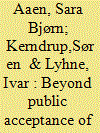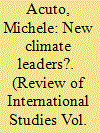| Srl | Item |
| 1 |
ID:
149992


|
|
|
|
|
| Summary/Abstract |
This article adds to the growing insight into public acceptance by presenting a novel approach to how citizens make sense of new energy infrastructure. We claim that to understand public acceptance, we need to go beyond the current thinking of citizens framed as passive respondents to proposed projects, and instead view infrastructure projects as enacted by citizens in their local settings. We propose a combination of sensemaking theory and actor–network theory that allows insight into how citizens enact entities from experiences and surroundings in order to create meaning and form a reaction to new infrastructure projects. Empirically, we analyze how four citizens make sense of an electricity cable project through a conversation process with a representative from the infrastructure developer. Interestingly, the formal participation process and the materiality of the cable play minor roles in citizens' sensemaking process. We conclude that insight into the way citizens are making sense of energy infrastructure processes can improve and help to overcome shortcomings in the current thinking about public acceptance and public participation.
|
|
|
|
|
|
|
|
|
|
|
|
|
|
|
|
| 2 |
ID:
123351


|
|
|
|
|
| Publication |
2013.
|
| Summary/Abstract |
Little interest has thus far been paid to the role of cities in world politics. Yet, several are the examples of city-based engagements suggesting an emerging urban presence in international relations. The Climate Leadership Group, despite its recent lineage, is perhaps the most significant case of metropolitan intersection with global governance. To illustrate this I rely on Actor-Network Theory (ANT) to develop a qualitative network analysis of the evolution of the C40 in the past seven years from a limited gathering of municipal leaders to a transnational organisation partnering with the World Bank. Pinpointed on the unfolding of a twin diplomacy/planning approach, the evolution of the C40 can demonstrate the key role of global cities as actors in global environmental politics. These cities have a pivotal part in charting new geographies of climate governance, prompting the rise of subpolitical policymaking arrangements pinpointed on innovative and hybrid connections. Yet, there remains some important rational continuity, in particular with neoliberalism, which ultimately limits the revolutionary potential these cities might have for international relations.
|
|
|
|
|
|
|
|
|
|
|
|
|
|
|
|